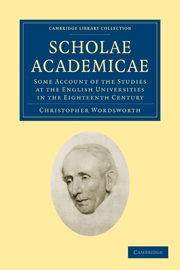 Scholae Academicae
Scholae Academicae Book contents
- Frontmatter
- PREFACE
- Contents
- CHAPTER I GENERAL INTRODUCTION
- CHAPTER II THE TRIPOS, name and thing
- CHAPTER III THE SOPHS' SCHOOLS before 1765
- CHAPTER IV ACTS AND OPPONENCIES after 1772
- CHAPTER V THE SENATE-HOUSE
- CHAPTER VI THE ADMISSION OF QUESTIONISTS. Huddling
- CHAPTER VII THE MATHEMATICKS
- CHAPTER VIII THE TRIVIAL ARTS
- CHAPTER IX HUMANITY
- CHAPTER X MORALS AND CASUISTRY
- CHAPTER XI LAW
- CHAPTER XII MODERN STUDIES
- CHAPTER XIII ORIENTAL STUDIES
- CHAPTER XIV PHYSICK
- CHAPTER XV ANATOMY
- CHAPTER XVI CHEMISTRY
- CHAPTER XVII GEOLOGY AND MINERALOGY
- CHAPTER XVIII BOTANY
- CHAPTER XIX The Degree of M.A.
- CHAPTER XX MUSICK
- CHAPTER XXI ASTRONOMY
- CHAPTER XXII CONCLUSION
- APPENDICES
- INDEX
CHAPTER XXI - ASTRONOMY
Published online by Cambridge University Press: 07 September 2010
- Frontmatter
- PREFACE
- Contents
- CHAPTER I GENERAL INTRODUCTION
- CHAPTER II THE TRIPOS, name and thing
- CHAPTER III THE SOPHS' SCHOOLS before 1765
- CHAPTER IV ACTS AND OPPONENCIES after 1772
- CHAPTER V THE SENATE-HOUSE
- CHAPTER VI THE ADMISSION OF QUESTIONISTS. Huddling
- CHAPTER VII THE MATHEMATICKS
- CHAPTER VIII THE TRIVIAL ARTS
- CHAPTER IX HUMANITY
- CHAPTER X MORALS AND CASUISTRY
- CHAPTER XI LAW
- CHAPTER XII MODERN STUDIES
- CHAPTER XIII ORIENTAL STUDIES
- CHAPTER XIV PHYSICK
- CHAPTER XV ANATOMY
- CHAPTER XVI CHEMISTRY
- CHAPTER XVII GEOLOGY AND MINERALOGY
- CHAPTER XVIII BOTANY
- CHAPTER XIX The Degree of M.A.
- CHAPTER XX MUSICK
- CHAPTER XXI ASTRONOMY
- CHAPTER XXII CONCLUSION
- APPENDICES
- INDEX
Summary
Sir Roderick (examining Immerito, a candidate for preferment). Sirrah, boy, write him down a good astronomer.
Page (aside, writes) ‘As colit astra.’
The Return from Parnassus (1602), i. 3.Though of old time the subjects of Arithmetic and Geometry were reserved for Bachelors in Arts to study, we have already said all that we have to say thereanent on the topic of the Mathematical Tripos.
Concerning Astronomy we have still a few remarks to make.
The Cambridge professors seem as a rule to have done their duty by this science. First and foremost we have Newton, who by exact scientific reasoning proved the guess of Descartes in his general hypothesis of matter and motion to be true, but in a different sense for the material universe.
Isaac Newton of Trinity was Lucasian Professor 1669—1702, and had his private observatory in the college.
His deputy and successor W. Whiston, of Clare, took interest in this pursuit. He records how Sam. Clarke and his father Alderman Clarke, of Norwich, about 1707 or 1708, ‘happened to be viewing Saturn's Ring at Norwich, with a Telescope of 15 or 16ft. long; when without any prior Thought or Expectation of such a thing, as Mr Clarke assured me, they both distinctly saw a fixed star between the Ring and the Body of that Planet: which is sure evidence that the Ring is properly distinct from the Planet, and at some distance from it: which, tho' believ'd, could hardly be demonstrated before.’
- Type
- Chapter
- Information
- Scholae AcademicaeSome Account of the Studies at the English Universities in the Eighteenth Century, pp. 241 - 251Publisher: Cambridge University PressPrint publication year: 2009First published in: 1877
